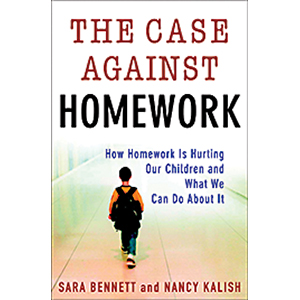
The Case Against Homework – The Real Way to Help
 “Kids today have twelve hours less of free time each week than they did in 1981,” according to the University of Michigan. This is problematic for a variety of reasons, but with regards to education, it means that children no longer have a period of consolidation, which actually maximizes learning. In other words, restful vacations, weekends, and evenings play a crucial role in allowing our children to wrestle with the concepts they’ve been learning in school. Unfortunately, as authors Sarah Bennett and Nancy Kalish point out, in this day and age you can forget about free time.
“Kids today have twelve hours less of free time each week than they did in 1981,” according to the University of Michigan. This is problematic for a variety of reasons, but with regards to education, it means that children no longer have a period of consolidation, which actually maximizes learning. In other words, restful vacations, weekends, and evenings play a crucial role in allowing our children to wrestle with the concepts they’ve been learning in school. Unfortunately, as authors Sarah Bennett and Nancy Kalish point out, in this day and age you can forget about free time.
Part of the problem is the way homework has changed. Thanks to buzz words like parent-teacher partnerships, homework can’t have the hands-off approach it once had. While the idea of collaboration sounds wonderful, as Bennett and Kalish explain, “there’s little excitement or joy when parental involvement consists of haranguing, cajoling, bribing, begging kids to do their assignments, as well as teaching them the concepts and study skills they need to complete them.”
Another problem with homework is that ideally it should be individualized. Of course, The Case Against Homework recognizes “few teachers have the time to individualize assignments given today’s class sizes, the limited hours they get to prepare lessons, and the many nonteaching duties pressed upon them.” As a result, homework becomes a “one-size-fits-all” activity, which amounts to little more than busywork.
Assuming your child is like most students lugging home a backpack stuffed with homework, you need what Bennett and Kalish call homework triage. I found this tip particularly helpful. “The usual advice is to get the hardest most time-consuming ones out of the way first. Instead, we suggest advising kids to start with the assignments that have the most educational value, such as reading or those that involve original thinking, when they’re freshest. Then, depending on how much time they’ve already spent, their energy level, and their remaining enthusiasm, you can decide whether it’s work tackling those others that are more questionable in value.”
The Case Against Homework does a great job of deconstructing typical homework assignments, such as the reading log – where young children waste time they could be listening to or reading books writing down their titles instead – and writing sentences with spelling words – where children look up definitions for long lists of words instead of those found while reading. Basically, if your gut is telling you it’s a waste of time it probably is.
For example, as Bennett and Kalish argue, the research proves “it’s preferable for children to really absorb five to ten words each week instead of memorizing twenty to twenty-five words they might not retain.” After all, even the U.S. Department of Education asserts, “five (math) problems is all it takes to demonstrate whether a child understands how to do them – or not.” Yet my fourth-grader had thirty long division problems for homework just last week.
Sometimes, Bennett and Kalish maintain, a parent’s best course of action is to simply say, “Stop for tonight.” I did it with my frustrated kindergartener, who completed her counting exercises but couldn’t get through the coloring without crying. Seeing no value in continuing, I simply wrote a note on her homework that she was unable to finish. But my daughter reacted as Bennett and Kalish say some might, fearful of getting in trouble.
Therefore, if you’re thinking of adopting the ten-minute rule I wrote about last week, according to The Case Against Homework, “the best bet is to have a family meeting and be honest with your child. Admit that what you’re doing is not working and that you’re going to try something different. Just opening up the discussion with your child can be a big relief for her.”
As far as Bennett and Kalish are concerned, you are not teaching your children to be disrespectful if you condone them skipping some homework rather “you’re teaching them to question it in a healthy way and not blindly follow every rule that’s set out for them in life.” And if homework overload is really causing your child to suffer and you don’t do anything, then The Case Against Homework argues “the repercussions to their mental and physical health could be worse than anything the school could dish out.”
Don’t forget to like Parenting by the Book on Facebook for updates on blog posts.
Read my other blog Befriending Forty at http://befriendingforty.blogspot.com and find out what happens when the person you thought you’d be meets the person you actually became.






